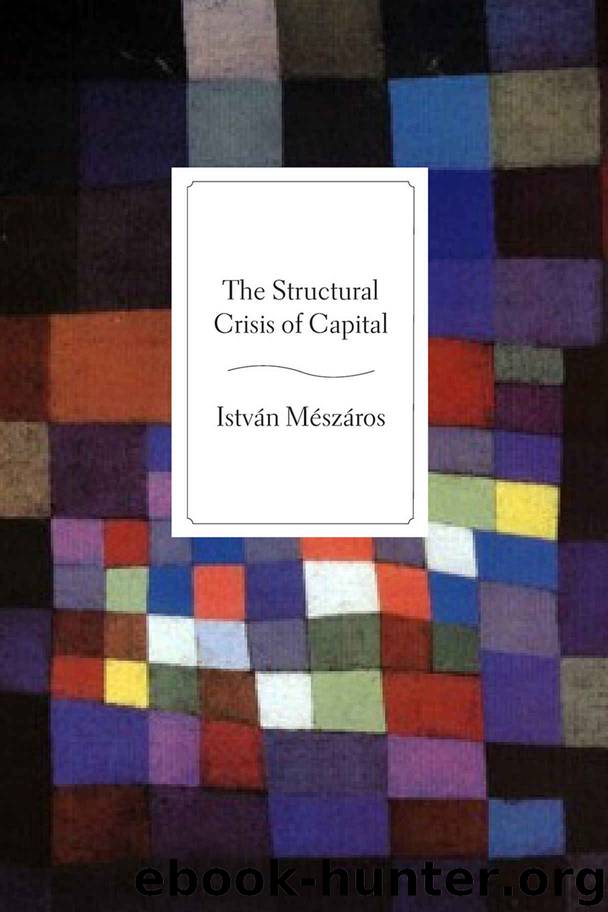The Structural Crisis of Capital by Istvan Meszaros

Author:Istvan Meszaros
Language: eng
Format: mobi
Publisher: Monthly Review Press
Published: 2010-02-28T23:00:00+00:00
CHAPTER FIVE
Bolívar and Chávez: The Spirit of Radical Determination1
1. FEATHERS CARRIED BY THE TEMPEST
In the Summer of 2005, Venezuela commemorated the bicentenary of Simón Bolívar’s oath, made in the presence of his great teacher, Simón Rodríguez—a man who later in Paris, well before Marx, frequented socialist secret societies and returned to South America only in 1823. Bolívar’s oath took place on August 15, 1805, on the outskirts of Rome. Already the place itself—the hill of Monte Sacro—which they had chosen together for this solemn occasion, was indicative of the nature of the young Bolívar’s historical pledge. On the hill of Monte Sacro, twenty-three centuries earlier, the rebellious protest of the plebeians against the patricians in Ancient Rome, under the leadership of Sicinio, was supposed to have taken place. At that time the rebellion of the Roman populace is said to have been brought to an end by the rhetoric of that notorious pillar of the established order, Senator Menenius Agrippa, who was preaching the familiar wisdom of the ruling classes according to which the people “not destined to rule” should willingly accept “their place in the natural order of society.”
In firm defiance of the resignation that emanates from the successfully imposed iniquitous relations of power everywhere, the young Bolívar expressed his determination on Monte Sacro to dedicate his life to a struggle envisaging a victorious outcome against colonial domination in his part of the world. These were his words:
I swear before you; I swear by the god of my fathers; I swear by my ancestors; I swear by my honor and I swear by my homeland that I will not allow my arm to rest, nor my soul to repose, until we have broken the chains which oppress us by the will of Spanish power.2
Bolívar never wavered in his radical determination as expressed in his oath, not even under the most adverse circumstances. The years ahead made him realize that fundamental changes had to be made not only in the international political and military power relations but, more profoundly, in the existing social order if the project of putting an end to colonial rule was to succeed. Such radical social changes included the liberation of the slaves, which his own class vehemently opposed. Even his beloved sister considered him “crazy,” because of his unyielding insistence on equality.
Bolívar called equality “the law of laws,” adding that “without equality all freedoms, all rights perish. For it we must make sacrifices.”3 He professed all of this in a truly uncompromising sense. He proved the validity of his own deeply held principles and beliefs, and did not hesitate for a moment to free all of the slaves on his own estates, in his resolve to give as broad a social base as possible to the struggle for a complete and irreversible emancipation from deeply entrenched colonial rule. In his magnificent address to the Congress of Angostura, in February 1819, he singled out the liberation of the slaves as the most vital of all of
Download
This site does not store any files on its server. We only index and link to content provided by other sites. Please contact the content providers to delete copyright contents if any and email us, we'll remove relevant links or contents immediately.
International Integration of the Brazilian Economy by Elias C. Grivoyannis(111059)
The Radium Girls by Kate Moore(12028)
Turbulence by E. J. Noyes(8049)
Nudge - Improving Decisions about Health, Wealth, and Happiness by Thaler Sunstein(7707)
The Black Swan by Nassim Nicholas Taleb(7129)
Rich Dad Poor Dad by Robert T. Kiyosaki(6632)
Pioneering Portfolio Management by David F. Swensen(6301)
Man-made Catastrophes and Risk Information Concealment by Dmitry Chernov & Didier Sornette(6019)
Zero to One by Peter Thiel(5802)
Secrecy World by Jake Bernstein(4753)
Millionaire: The Philanderer, Gambler, and Duelist Who Invented Modern Finance by Janet Gleeson(4478)
The Age of Surveillance Capitalism by Shoshana Zuboff(4292)
Skin in the Game by Nassim Nicholas Taleb(4248)
The Money Culture by Michael Lewis(4207)
Bullshit Jobs by David Graeber(4190)
Skin in the Game: Hidden Asymmetries in Daily Life by Nassim Nicholas Taleb(4007)
The Dhandho Investor by Mohnish Pabrai(3765)
The Wisdom of Finance by Mihir Desai(3747)
Blockchain Basics by Daniel Drescher(3583)
